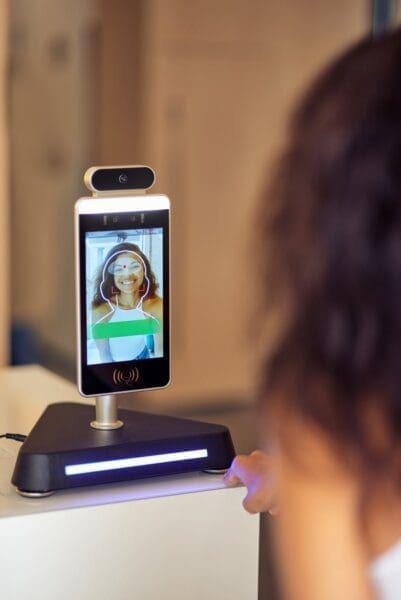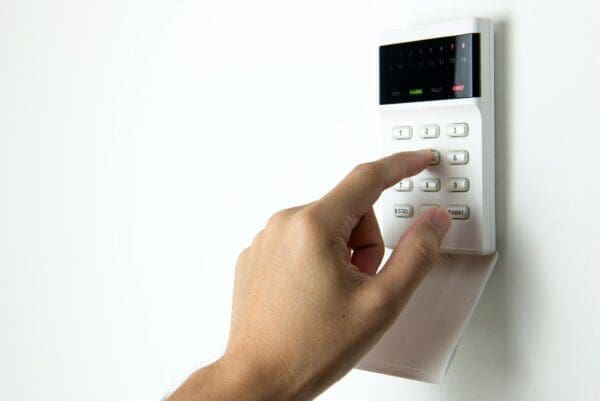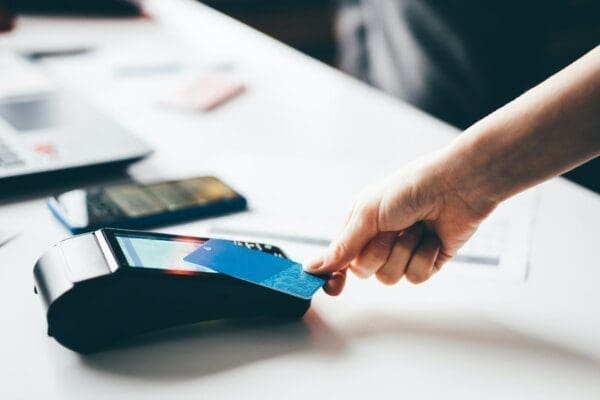The Necessity for Security at UK Grocery Stores
Supermarkets are one of the busiest groups of establishments you will find, with a constant stream of people entering and exiting. This, coupled with the fact that many are now primed to sell more than just food, can often make them a target for would-be criminals. However, with the integration of new security technology, queues will hopefully be reduced if not eliminated, and the most persistent of crimes, shoplifting, will be prevented.
A recent report suggested that up to 40% of retail customers felt some concern for their safety while in a grocery store. As a result, supermarkets across the UK are investing in high-end, integrated security technologies to ensure their premises are as safe as possible. This article will explore the various security technologies that business owners are using to protect their staff, their premises, and their customers.
Security Technologies Used by UK Grocery Stores
An Integrated Access Security System
A few years ago, business owners would have had several security strategies and amenities to help protect their business. However, they would have almost definitely been operated or accessed independently of one another. As a result, it was far easier for criminals to slip through the net.
But, this is no longer the case. The introduction of integrated access security systems involves bringing together all individual security components such as, intrusion detection, control access, video security. The system merges together each operational procedure to form a single centralised control portal.
The benefits of this type of system are plentiful. Firstly, it streamlines the security process and allows for far more robust and effective action should a crime be committed. Also, individual components of the system can work in conjunction with one another. For example, video and detection sensors can be automatically linked to an alarm system. They are also highly customisable depending on the type of business you are operating.
Within the integrated access system, you will often find several key security components that are used to safeguard premises.
Video Security Technology

Any commercial business should look to invest in efficient video security technology, no matter its size. It helps to record access to all areas of a premise to minimise the risk of burglary and damage.
Security camera technology has become far more sophisticated and versatile than it was before. A store can utilise a commercial video intercom system at entry points to verify visitors’ credentials. This is particularly useful for those stores that are open 24 hours when the main store entrances are locked, and employees are required for after hours.
When used in conjunction with video security, cloud-based remote management systems are also becoming more widely used. Remote access to video recordings allows security teams to manage security without being on-site. This means that businesses can operate with a smaller staff, thus saving on costs.
Sticky Learning ® is 7 times more effective than 1-day training courses. Plus, you will get a Chain of Evidence proving your Return on Investment. Discover soft skills training that changes behaviours long term.

Privacy-Preserving Age Estimation Technology
While many worry about the use of security video systems as the precursor for a “big brother” surveillance society, new video technology is being developed that preserves privacy. This is an interesting twist in the concept of video recording, surveillance, and management.
For example, when younger customers buy alcohol at a self-checkout there is a camera on the checkout screen. This kind of smart checkout integrates “privacy-preserving age estimation technology” that can accurately estimate a customer’s age. ASDA have already begun trials of this in their stores, and other stores like Tesco, Aldi and Co-op are also scheduled to turn trials.
This software may end employees checking ID altogether permitting them to concentrate on serving customers in ways that machines cannot.
Facewatch, Facial Recognition, and Controversy

Facewatch is facial recognition technology that has been cited in news reports since its inception. It is a highly controversial use of technology and most recently the House of Commons Science and Technology Committee called upon UK police to end its use until regulation has been legislated.
With crime on the rise, there is an increasing demand for this type of technology in shops and grocery stores. Numerous technology companies sell facial recognition software for retailers because shoplifting does not necessarily garner much police attention. As law enforcement budgets have undergone severe cuts, fewer resources are dedicated to shoplifting or petty thievery. Rapid technological advances and the lower expense connected to security technology, make it an increasingly appealing alternative.
Facial recognition software is powered by algorithms. Algorithms are supplied with large quantities of photographs of people. They are told which persons in the photographs are the same people. The algorithm will then analyse and select features through which they can be identified. They also assess light and dark gradients to build 3D images.
Identification
Specific characteristics used in identification remain unknown, but the algorithm system is quite accurate in identification. While this technology is controversial, when compared to eyewitnesses who can involuntarily make mistakes, these machines are highly accurate. And they are reducing the risk of condemning innocent people.
If one considers that carrying a smartphone at all times with current GPS capabilities relates much more about us at any time of day or night, complaining about facial recognition may seem, in the final analysis, a bit unimpressive.
This facial recognition technology watches people entering stores and compares their pictures to those stored in the database of “SOI – Subjects of Interest”. Should the system recognize an SOI, it will send an alert very discreetly to management. As more retailers request and integrate this technology, it stands to reason that legislation will follow.
Touchless and Keyless Access Control
It is not just on the shop floor that managers and business owners need to remain vigilant. While the number of reported employee thefts in the UK has continued to fall over the last few years, it is something that still happens.
One solution is a commercial keyless door entry system. This allows for authorised access to a building without the need for a physical key and is often used in conjunction with video intercom technology. Access usually comes in the form of proximity key cards or fobs, though many modern systems also use mobile-based access.
There are many benefits to this type of access. End-to-end encryption provides an administrator more insight into who accesses the entry points and when so they can corroborate this information with employee scheduling. Unauthorised or unexpected access can instantly be flagged and investigated further.
They are also better equipped to deal with modern security threats. Each access card is unique in its credentials, and unlike a physical key, these cannot be copied. Additionally, most entry points do not store data, so they cannot be targeted by hackers looking to obtain this information.
Alarm Systems

All business premises should be equipped with an efficient alarm system. For grocery stores, a number of options can be explored.
As a primary starting point, anti-theft barcode alarms should be placed at all customer entrance and exit points. These will be alerted whenever an unscanned barcode passes through them, usually accompanied by flashing lights and loud noises.
An alarm can also form part of your integrated security system. Notifications of security anomalies can be sent to a smartphone for further investigation, allowing for security management even when not on the premises. These apps will also allow you to remotely control cameras and other security software.
Alarms can also be connected to an alarm receiving centre which will automatically receive the alert and, if necessary, pass the concern across to the relevant authorities.
Customer Security and Health Concerns
Security and the sensation of feeling secure is equally as important for customers as it is for proprietors and management. Customers express increasing concern about security measures during shopping, particularly in the evenings, or in areas with a high crime incidence reported.
The pandemic Covid-19 crisis also highlighted the need for health security. Criminals are now not the only threat plaguing retail customers. UK grocery stores are stepping up to the challenge by adopting new technology to address health concerns and customer safety. These may include enhanced lighting and video monitoring of parking lots and outside areas around supermarkets.
While some security technologies may not be designed specifically for grocers, they are certainly relevant. Here are some of the most recent technologies introduced into UK Grocery stores.
Contactless
Contactless payment methods not only protect customers but retailers as well. Transactions can be made safely with no contact whatsoever. EMV and tap payments are more secure than the older magnetic strip card.

Terminals now generate a one-time passcode for each individual payment, so it’s highly unlikely scammers can steal credit card or debit card information. EMV comes with embedded cryptograms that are difficult to fake and very expensive.
Tap-to-pay not only protects customers and staff physically but use radio waves featuring a one-time encrypted number or code so transactions are processed immediately and securely.
Scan Pay Go
This technology permits customers to use an app on smartphones or the grocer’s device to scan products and bag them directly. This also assists in keeping a tab on how much they are spending. Customers are able to shop independently without interacting with staff or other customers. Shopping is faster with a reduction in queues and better management of crowd flows.
UK grocer Sainsbury’s Supermarkets UK has introduced SmartShop, and Asda Grocery Store UK has introduced it in approximately 600 of its stores. M&S now has more than 100 stores with “Mobile Pay and Go” and Tesco Supermarket UK offers “Scan as You Shop” in almost 600 stores.
No Checking Out
Aldi is working on what should be a rival to Amazon Go grocery, as it will be cashier-less. Aldi is in the market for automatic product recognition technology. The concept is simple. Store cameras, shelf sensors, or customers’ smartphones will replace the need for a cashier. Amazon Go groceries wants stores to replace checkouts with ”Just Walk Out” technology. This means that shoppers need only to have a credit card while sensors and cameras keep track of purchases and charge customers once they leave the store. Contactless and quick. In an Amazon fresh store payment and checkout is totally automated. This is so that clients can enter, pick up merchandise and leave without either queuing or passing the checkout. This is possible because payment is made with the Amazon Go app.
The Tesco store in London is known as GetGo and has thousands of cameras, artificial intelligence technology, and weighted shelves that note what clients purchase and bill them as they leave.
Similarly, Morrisons is also integrating smart technology in its Project Sarah in Bradford and has programmed the opening of small smart stores in heavily trafficked locations.
Automated Robot-Powered Warehouses
With the arrival of the Covid-19 pandemic, grocery stores were under siege as so many other businesses closed. Delivery from Ocado made use of warehouses powered by robots to keep up with Ocado online shopping when orders overwhelmed the human staff during COVID-19. Robots would pick up food and carry them to humans who then prepared and paced orders for delivery. This reduced interaction among staff employees, thus protecting health.
Ocado already owns numerous patents for automation services and technologies that include product-choosing to item-scanning headgear. Because of its effectiveness during the pandemic, the company plans on widening the use of these technologies as well as leasing them to other retailers.
Tesco also plans to have 25 urban fulfilment centres that are highly automated. This is because customer preferences are shifting to Tesco online shopping UK as opposed to visiting a brick and mortar store.
Social Distancing

Aldi groceries UK has integrated a customer traffic light that alerts clients when they can enter safely. Doors automatically open when the traffic light turns green.
Hygiene
Security is no longer limited to crime prevention alone. One thing that Covid-19 has taught us is the importance of hygiene and sanitation particularly in public shared areas. Asda Grocery Store UK was the very first supermarket in the UK to introduce autonomous robots for cleaning purposes. These were introduced to fight the spread of Covid-19. The robots were employed as automated trolley washers as well as riding machines.
Reducing Shoplifting and Theft
Shoplifting is, unfortunately, a widespread phenomenon and will cost retailers billions of pounds annually. Sainsbury’s works with security solutions company ThirdEye’s concealment detection technology to discover when thieves place products inside coats or pockets. These activities are recorded, and security personnel are alerted.
Through testing initial versions of this technology, Sainsbury’s prevented approximately 6,000 thefts in the period from September 2019 and March 2020.
The introduction of self-scanning machines has also increased theft. The amount of theft has been found to be in direct correlation to the number of self-scanners. Some grocery stores have cut back while others like Tesco install Livestream cameras at self-checkouts so that scanning is recorded.
New technology is also reducing employee theft, by reducing staff through artificial intelligence and automation.
Final Thoughts on UK Grocery Stores
The problem of store theft is one that will likely never go away. This is especially true now with an abundance of additional goods available in most supermarkets. However, technology continues to advance rapidly, and security strategies and amenities are now more sophisticated than ever before.
When technology is used properly and is respectful of individual freedoms and rights, it can be one of the best tools for ensuring the safety of goods, property, and above all, people. It also will, in the end, offer increased convenience, save time, and may even render grocery shopping a tad more fun.
If you found this article on UK grocery stores helpful, why not check out this one on macro trends in the UK grocery industry.
Action: For more about grocery, check out our ultimate guide on GSCOP.




